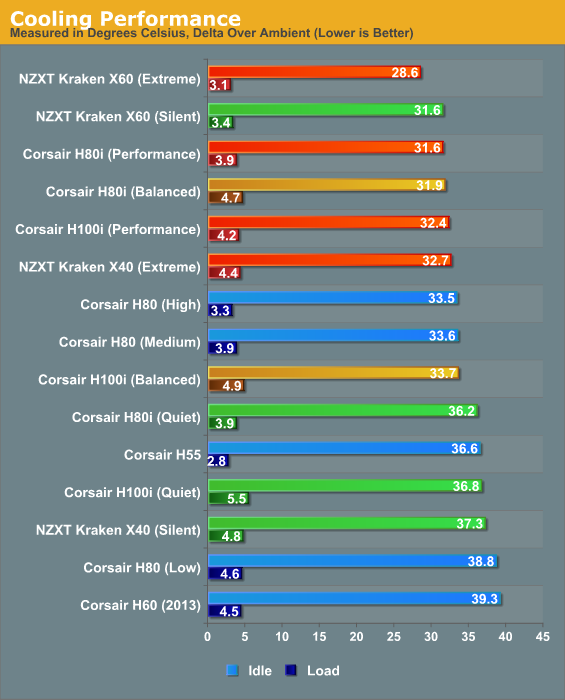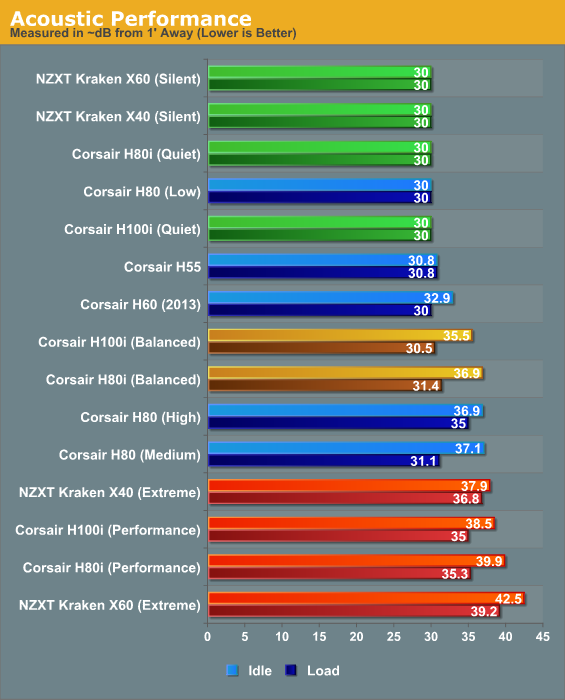Closing the Loop: Contained Liquid-Coolers from Corsair and NZXT Compared
by Dustin Sklavos on December 26, 2012 12:01 AM ESTPerformance Results
Going into testing, it's pretty easy to expect how the coolers should ultimately stack up: Corsair's H55 should be last, followed by the H60, the H80, the H80i, the NZXT Kraken X40, the H100i, and then the NZXT Kraken X60 at the top of the list. The X40 and H80i should compete pretty closely; the X40 has a larger surface, but the H80i has a thicker radiator and a second fan. Corsair's also been happy to advertise that these "2013" radiator fans are based on their successful SP120 radiator fans, which makes sense. We found the Silent SP120 to be pretty solid while the Performance model was at the top of its game if noise was a non-issue.
Keep in mind, though, NZXT's stock radiator fan did surprisingly well in our testing too.
So how did these systems turn out?

Surprisingly, two early favorites turn out to be major underperformers: the Corsair H100i for some odd reason is consistently worse than the H80i (and I did retest to confirm), while the Kraken X40 needs to run at full bore to produce decent results. Meanwhile, the H55 with its constant fan speed actually manages to best the new H60 (though PWM control may certainly contribute to that).
So where are the big winners? While the H80i is pricy, it does perform notably better than its predecessor, producing better thermals at a lower setting. And the most expensive system of all at least earns its price tag; the NZXT Kraken X60 turns out to be every bit the cooling monster the rep promised it would be, meeting or beating every other cooler at its lowest setting.

As far as noise is concerned, the X60 is once again at the top of the pack. Note that our sound meter doesn't go below 30dB and the X60 is noticeably louder than the X40, but not by much and not enough to really change the way things turn out.
So how do noise profiles change the standings? The X60 excels in both disciplines and is essentially undefeated, but the Corsair H55 makes a good case for itself. Thermal performance isn't fantastic, but it's quieter than the H60 under load while running cooler. Meanwhile the H80i remains basically the best offering in Corsair's lineup, running slightly cooler and quieter than the single-fan Kraken X40.










68 Comments
View All Comments
buhusky - Wednesday, December 26, 2012 - link
i'm interested to see the comparison of these vs. the stock air cooler included with the processor. sure, i could go find it somewhere else, but it'd help make this a more complete review if it was all just here, imoBeenthere - Wednesday, December 26, 2012 - link
Unless you have some space limitation preventing you from using a quality HSF, a Closed Loop Cooler is a poor choice and has the very real liability of a water leak damaging your hardware, data loss, RMAs, etc.When you can buy a highend HSF for ~$60. that cools better, is quieter and never leaks water to damage your PC hardware, you'd be ignorant to buy a CLC which is inferior in every way as independent testing has confirmed.
The Xigmatek Aegir SD128264 double heat-pipe HSF is a perfect example of a very quiet, cost effective, HSF fully capable of cooling an AMD FX CPU OC'd to 4.8 GHz. without issue. There are other HSFs with dual fans that cost more but few perform better than the Aegir. Note that the Xigmatek Aegie and other HSFs cool better than the Corsair H100 and AMD CLC cooler both of which are inferior and can leak water.
http://www.newegg.com/Product/Product.aspx?Item=N8...
http://www.frostytech.com/articleview.cfm?articlei...
FriendlyUser - Wednesday, December 26, 2012 - link
Thanks for the review. It would be great to include the stock cooler and a good air cooler (Noctua, Thermalright or even the cheap CoolerMaster 212 EVO).I'm tempted by closed-loop coolers, but I'm not sure the technology is yet mature. I think it's the future...
etamin - Wednesday, December 26, 2012 - link
I'd like to see a CM Hyper 212 thrown into the charts for some kind of air cooler reference. That would be a big help to determining value.cmdrdredd - Wednesday, December 26, 2012 - link
As was said it would be nice to have a really high end air cooler from Noctua like the NH-D14 in the charts for reference. I mean, the noctua can be found for around $80 and the mounting is solid (no plastic to strip although it is heavier so...). Is a $140 closed water system worth an extra $60?rrohbeck - Wednesday, December 26, 2012 - link
The NH-D14 is on sale for $69.99 AR today at Newegg.Spacecomber - Wednesday, December 26, 2012 - link
Are these kits strictly designed to be CPU coolers, or are they expandable to include GPU and maybe even MB chipset cooling, too?Sorry if I missed the answer to this in quickly reading through the article. It seems like if you are going to switch over to a liquid cooling system, you'd also want it to include the GPU (at least this would be true for enthusiasts who also enjoy computer gaming).
If these are CPU only kits, I suppose they might find a place in a media player computer.
A5 - Thursday, December 27, 2012 - link
These kits are CPU only. You could probably hack a GPU block into one of the dual-length systems, but at that point you should just go full custom and get better performance.Foeketijn - Friday, December 28, 2012 - link
There are simple mounting frames to screw the 2012 Antec and corsair blocks on any recent GPU. But from what I see in reality, most people use tie wraps ; ). IMHO these closed loop cooler are more suitable for GPU's since the radiator conducting properties (relatively thin and aluminum) are often the limiting factor (considering the results according to the tweakers who changed the radiator of these things). The efficiency goes up when you1. Get more air in contact with the radiator (bigger radiator, better fan, a bit of spacing between the fan and the radiator to avoid airflowing "dead spots")
2. Get more heat from the water to the actual air (copper radiator, more fins etc.)
3. Get the temp delta bigger. (colder air or warmer water)
Cooling the GPU does number 3. Since modern GPU's can draw a lot more power than a CPU especially @stock and they function without a problem at much higher temps.
Novuake - Thursday, December 27, 2012 - link
No Static Pressure readings? Nothing about the pumps on these thinks? Thermal paste that come with them? Really... What is going on with Anandtech? MORE DATA! More effort into this PLEASE...